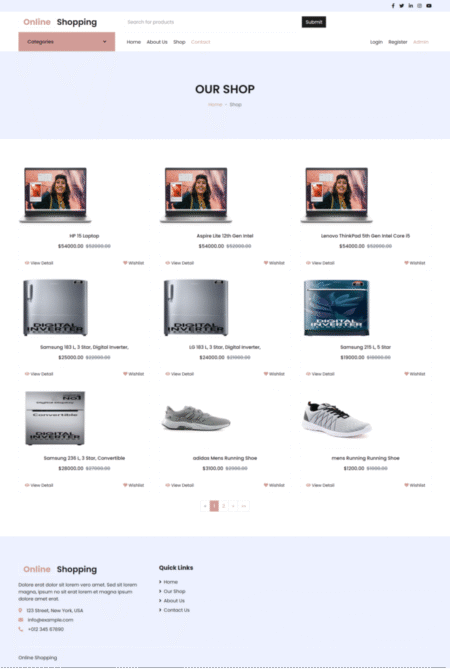Welcome to our new series on Universal Design for Pharmacies! In this segment, we’ll explore the importance of Universal Design in Pharmacies for All Disabilities.
In the digital age, pharmacies are increasingly relying on online platforms to provide services such as prescription refills, health consultations, and customer support. Ensuring that these digital services are accessible to everyone, including individuals with disabilities, is essential. The Web Content Accessibility Guidelines (WCAG) offer a framework for creating accessible digital content, and Universal Design principles can help pharmacies align with these standards.
What is WCAG?
WCAG, or Web Content Accessibility Guidelines, is a set of international standards developed by the World Wide Web Consortium (W3C) to ensure that web content is accessible to individuals with disabilities. These guidelines are organized into four principles: Perceivable, Operable, Understandable, and Robust (POUR). Compliance with WCAG standards helps pharmacies create inclusive online services that cater to diverse customer needs.
Key WCAG Principles for Pharmacies
- Perceivable:
- Ensure that all information and user interface components are presented in ways that can be perceived by all users. For example, provide alternative text for images, captions for videos, and text transcripts for audio content.
- Operable:
- Make all functionality available to users through various input methods, such as keyboard navigation. Ensure that interactive elements, such as buttons and forms, are easily operable by individuals with mobility impairments.
- Understandable:
- Design content and interfaces that are easy to understand and use. This includes providing clear instructions, avoiding complex jargon, and ensuring that navigation is intuitive.
- Robust:
- Create content that is compatible with a wide range of assistive technologies, such as screen readers and magnifiers. Ensure that digital platforms are designed to adapt to future technologies and standards.
Universal Design Principles for WCAG Compliance
Universal Design is the practice of creating products, environments, and services that are accessible and usable by all people, regardless of their abilities. By incorporating Universal Design principles, pharmacies can meet and exceed WCAG standards.
- Equitable Use:
- Design online services that are accessible to all customers without discrimination. For instance, ensure that websites and apps are compatible with assistive technologies.
- Flexibility in Use:
- Offer multiple methods of interaction, such as voice commands, touchscreens, and keyboard navigation, to accommodate diverse customer needs.
- Simple and Intuitive Use:
- Ensure that digital platforms are straightforward and easy to navigate for everyone. Use clear labels, organized menus, and user-friendly designs.
- Perceptible Information:
- Communicate essential information effectively to all users, regardless of their sensory abilities. Provide alternative text for images, use large print, and offer audio descriptions.
- Tolerance for Error:
- Minimize hazards and adverse consequences through accessible designs. For example, provide error messages that clearly explain how to correct mistakes.
- Low Physical Effort:
- Design digital platforms that require minimal physical effort to use. This includes ensuring that interfaces are accessible via keyboard shortcuts and voice commands.
- Size and Space for Approach and Use:
- Ensure that digital content is accessible on various devices, including desktops, tablets, and smartphones. This allows customers to access services regardless of their device or location.
Benefits of WCAG Compliance Through Universal Design
Enhanced Customer Experience
- Accessible digital platforms create a more welcoming and efficient environment for all customers. This leads to higher satisfaction and loyalty, as customers feel valued and respected.
Increased Accessibility
- Compliance with WCAG standards ensures that all customers, including those with disabilities, can access and use online pharmacy services independently and with dignity.
Legal Compliance
- Adhering to WCAG standards helps pharmacies comply with accessibility regulations, such as the Americans with Disabilities Act (ADA). This reduces the risk of legal issues and penalties.
Positive Reputation
- Pharmacies that prioritize digital accessibility are viewed positively by the community. This commitment builds trust and attracts a diverse customer base.
Better Health Outcomes
- Accessible online services enable customers to access essential healthcare information and services, leading to improved health outcomes and overall well-being.
Compliance with WCAG standards is a critical aspect of creating accessible and inclusive digital platforms for pharmacies. By adopting Universal Design principles, pharmacies can ensure that their online services are usable by all customers, regardless of their abilities. This commitment to accessibility and inclusivity benefits customers, enhances the pharmacy’s reputation, and fosters a more equitable healthcare environment.
Let’s work together to create a world where digital healthcare services are accessible to everyone.
Source: Read MoreÂ


